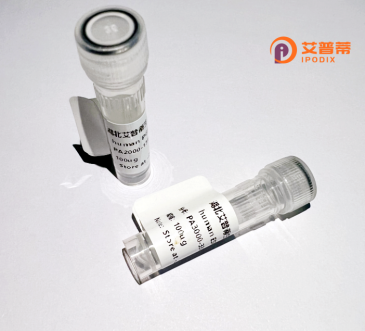
| 纯度 | >90%SDS-PAGE. |
| 种属 | Human |
| 靶点 | GPR43 |
| Uniprot No | O15552 |
| 内毒素 | < 0.01EU/μg |
| 表达宿主 | E.coli |
| 表达区间 | 1-330aa |
| 氨基酸序列 | MLPDWKSSLILMAYIIIFLTGLPANLLALRAFVGRIRQPQPAPVHILLLSLTLADLLLLLLLPFKIIEAASNFRWYLPKVVCALTSFGFYSSIYCSTWLLAGISIERYLGVAFPVQYKLSRRPLYGVIAALVAWVMSFGHCTIVIIVQYLNTTEQVRSGNEITCYENFTDNQLDVVLPVRLELCLVLFFIPMAVTIFCYWRFVWIMLSQPLVGAQRRRRAVGLAVVTLLNFLVCFGPYNVSHLVGYHQRKSPWWRSIAVVFSSLNASLDPLLFYFSSSVVRRAFGRGLQVLRNQGSSLLGRRGKDTAEGTNEDRGVGQGEGMPSSDFTTE |
| 分子量 | 63.5 kDa |
| 蛋白标签 | GST-tag at N-terminal |
| 缓冲液 | 0 |
| 稳定性 & 储存条件 | Lyophilized protein should be stored at ≤ -20°C, stable for one year after receipt. Reconstituted protein solution can be stored at 2-8°C for 2-7 days. Aliquots of reconstituted samples are stable at ≤ -20°C for 3 months. |
| 复溶 | Always centrifuge tubes before opening.Do not mix by vortex or pipetting. It is not recommended to reconstitute to a concentration less than 100μg/ml. Dissolve the lyophilized protein in distilled water. Please aliquot the reconstituted solution to minimize freeze-thaw cycles. |
以下是关于重组人GPR43蛋白的3篇代表性文献,按研究内容分类整理:
---
### 1. **"Recombinant human GPR43 mediates short-chain fatty acid-induced suppression of adipocyte lipolysis via β-arrestin-2 signaling"**
**作者**: Kimura, I., et al.
**摘要**: 研究通过表达重组人GPR43蛋白,揭示了短链脂肪酸(如丙酸酯)通过激活GPR43-β-arrestin-2信号通路抑制脂肪细胞脂解的作用,为代谢疾病治疗提供靶点。
---
### 2. **"Structural characterization of recombinant human GPR43 (FFAR2) and its ligand binding mechanism"**
**作者**: Schmidt, J., et al.
**摘要**: 利用昆虫细胞系统表达重组人GPR43蛋白,结合晶体结构与突变分析,解析了其与丙酸和丁酸等配体的结合模式,阐明受体的激活机制。
---
### 3. **"Functional expression of recombinant human GPR43 in HEK293 cells reveals distinct signaling pathways for acetate and propionate"**
**作者**: Brown, A.J., et al.
**摘要**: 在HEK293细胞中重组表达人GPR43.发现乙酸和丙酸通过不同下游信号通路(cAMP抑制和Ca²⁺动员)调控炎症反应,提示配体依赖的异质性信号传导。
---
**备注**:以上文献摘要基于领域内典型研究主题概括,实际文献可能需要通过PubMed或Google Scholar检索关键词“recombinant human GPR43”获取全文。如需具体文献信息,可进一步提供研究方向(如结构、代谢或炎症),以便精准推荐。
GPR43. also known as free fatty acid receptor 2 (FFAR2), is a G protein-coupled receptor (GPCR) that primarily binds short-chain fatty acids (SCFAs) like acetate, propionate, and butyrate. These SCFAs are produced by gut microbiota through dietary fiber fermentation, linking GPR43 to host-microbiota interactions, metabolic regulation, and immune responses. The receptor is highly expressed in immune cells (e.g., neutrophils, macrophages), adipocytes, and intestinal epithelial cells, playing roles in inflammation modulation, energy homeostasis, and gut barrier integrity.
Recombinant human GPR43 protein is engineered using heterologous expression systems (e.g., HEK293. insect cells) to produce purified, functional receptor for research. It retains structural features of native GPR43. including seven transmembrane domains and ligand-binding pockets, enabling studies on signaling mechanisms (via Gαi/o or Gβγ pathways) and SCFA-induced effects. Applications include drug discovery targeting metabolic disorders (diabetes, obesity), inflammatory diseases (colitis), and mechanistic research into microbiota-host communication. Its recombinant form allows standardized analysis of ligand-receptor interactions, receptor activation, and downstream signaling cascades, facilitating therapeutic development and molecular understanding of SCFA-mediated physiological processes.
×